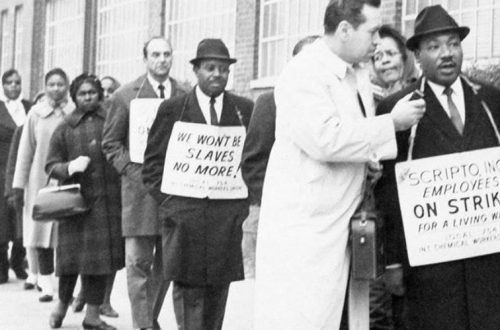During World War II, labor strikes in the US virtually ceased as unions and their members devoted their full efforts to winning the war. But the war’s end was followed by a wave of strikes as unions tried to win improvements in wages, benefits and working conditions which they had agreed to postpone until victory was achieved.
In 1947 Congress acted to rein in “Big Labor” by passing (over President Truman’s veto) what came to be known as the Taft-Hartley Act. Among its provisions was a section permitting states to outlaw union shop agreements between workers and management– what some anti-union PR genius labeled “right to work” laws.
These laws bar unions and employers from requiring all employees covered by a collective bargaining agreement to either join the union or pay the equivalent of dues to the union. However unions almost always represent employees who refuse to join or make payments. So these employees receive all the benefits of being union members– the wage and benefit increases negotiated by the union, the right to union representation in grievance and arbitration cases– without paying a dime of the costs. Which is why some of us call these people freeloaders.
Because “right to work” laws weaken unions, workers in states that have such laws earn an average of $1,500 less than workers in non-“right to work” states. Which is why some of us call them “right to work for less” laws.
Most “right to work” states are in the south and west. But since the passage of Taft-Hartley, anti-union business interests have tried repeatedly to introduce these laws elsewhere. And this week they succeeded in the state of Michigan.
In the low-turnout 2010 election, Republicans won the state’s governorship and control of the legislature. (Two years later, with a higher turnout, President Obama defeated Mitt Romney in Michigan, winning more than 54 percent of the vote.)
Now, in a lame-duck session, the legislature has passed and Governor Rick Snyder has signed “right to work” laws applying to private and public employees. Every Democrat and a handful of Republicans voted against the laws.
This represents something of a reversal for Snyder:
In 2011, despite Republicans working on right-to-work legislation, Snyder said he didn’t think it was “appropriate” and that the state had “higher priorities.”
“I don’t think it’s an appropriate subject for us to be dealing with today, because we have higher priorities that need to be addressed in our state,” Snyder told a radio program nearly a year ago to the day, Dec. 12, 2011. He added, “We need to come together as Michiganders and show some solid results on things we can agree on first before we have any discussion along those lines. As a practical matter, the other things I’d mention to you is that we do have to be more competitive, we do have to be more proactive, but I want to see how we can work together. So I’d just as soon work with labor on being proactive.”
Snyder’s tone has significantly changed. He contended Tuesday on MSNBC’s Andrea Mitchell Reports that signing this law is “about being pro-worker.”
Uh huh. In that case, Snyder must really hate cops and firefighters, because the new law exempts their unions from the “right to work” requirements. And if it’s such a great law for Michigan, why wasn’t there a signing ceremony? Why did Snyder sign it in private? What is he ashamed of?
Apparently realizing that a lot of Michiganders– perhaps a majority– won’t like these laws (and thousands turned out to protest on Tuesday), the legislature attached them to an appropriations bill.
[T]he Michigan Constitution provides that “[t]he power of referendum does not extend to acts making appropriations for state institutions or to meet deficiencies in state funds.” This is not the end of the story, however. Under that same constitution, Michigan voters may still restore the lost wages and collective bargaining power denied by this bill through a state ballot initiative.
So this isn’t the end. I speak from experience. When I moved to St. Louis in 1978, anti-union interests had managed to get a “right to work” amendment to the Missouri constitution on the statewide ballot. Along with many others, including thousands of rank-and-file union members, I was involved in the campaign to defeat the amendment. And in a state that is not exactly left-leaning, “right to work” lost by 20 percentage points.
So I can predict one thing: Republicans haven’t put this issue to rest. They’ve pissed off a lot of people who otherwise might have remained politically apathetic and uninvolved. It’s game on.
